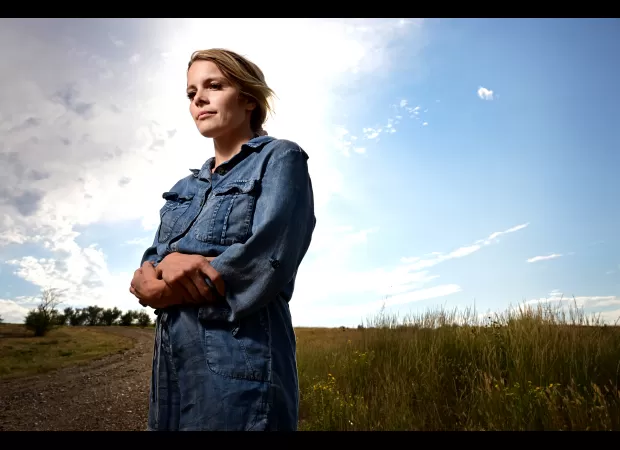25 counties in Colorado lack adequate maternity care, creating difficulties for mothers and infants' well-being.
2 out of 5 Colorado counties lack facilities and specialized providers for pregnancy care, affecting women in those communities.

Cheianne Pogline shared that her first pregnancy was a breeze when it came to getting prenatal care for her first child. The hospital where she planned to deliver the baby was conveniently located only seven minutes away from her home. However, things changed significantly with her next three pregnancies. In 2019, she and her husband moved from Craig to Parachute, which meant that the closest options for obstetrical care were now an hour away in either Glenwood Springs or Grand Junction. And when they moved back to Craig in 2022, they were surprised to find out that Memorial Regional Health had stopped offering maternity care. This meant that their closest option was now in Steamboat Springs.
Unfortunately, Cheianne's experience is not unique. In fact, two out of five counties in Colorado face the same challenge, with many communities lacking a place to give birth or providers who specialize in pregnancy care. As a result, women in these areas are more likely to skip prenatal care and have less healthy babies compared to those who have easier access to care. Reopening hospital birthing units is not a feasible solution in many places, so communities have had to get creative.
Cheianne was able to receive some care through a UCHealth outreach program where obstetricians from Steamboat Springs visited Craig. However, she still had to make an hour-long trip for her 20-week ultrasound and to meet with the doctor who would perform her cesarean delivery. While they were able to schedule the birth, Cheianne and her husband still worried about the possibility of labor starting early.
She shared, "With babies, you never know when they're going to come. You kind of always have that worry in your mind of, what happens if I deliver now?"
According to March of Dimes, 25 out of Colorado's 64 counties are considered "maternity care deserts". This means that these counties do not have a hospital that offers deliveries or a birthing center, and they also lack an obstetrician or midwife. This is a higher percentage compared to the national average of about one-third, as reported by Rebecca Alderfer, CEO of the Colorado Perinatal Care Quality Collaborative. Although the collaborative has not studied health outcomes in these counties, the state's most recent maternal mortality report found that mothers in the least-populous areas have four times the risk of dying during pregnancy or the postpartum period compared to those in urban areas. In fact, the risk is about 2.2 urban women per 10,000 births, compared to 8.2 women in the most remote counties.
While the long drive to the hospital may seem like the most dramatic aspect, the lack of access to routine care is actually the bigger problem. This means that certain conditions may go untreated, leading to potential complications. To address this issue, the collaborative and other organizations are working together to increase remote monitoring of patients, bring midwives into rural areas, and train local doctors to handle pregnant and postpartum patients' physical and mental health. This is especially important as suicide and overdoses are the top causes of maternal mortality in Colorado.
Dr. Laurie LeBleu, an obstetrician-gynecologist with UCHealth, shared that not all communities can support a hospital labor and delivery unit or a birthing center. However, they do need a provider who can offer prenatal care at least once a week, as well as transportation options for families to access care that is not available locally. In a normal, uncomplicated pregnancy, the birthing parent would see a doctor every four weeks for the first 28 weeks, every two weeks until week 36, and then once a week until week 40. Those who go past their due dates may need more frequent monitoring.
Unfortunately, pregnant women living in maternity care deserts were more likely to report starting prenatal care five months into their pregnancy or later, according to a study from Colorado State University's Regional Economic Development Institute. They also have higher rates of premature birth and infant mortality compared to those in areas with better access to care.
Denise Smith, project director for the Colorado Rural Midwifery Workforce Expansion program, shared that some rural hospitals have expressed interest in bringing back labor and delivery or at least offering prenatal care in their communities. The University of Colorado's College of Nursing received a $2 million grant to fund scholarships for aspiring nurse-midwives who agree to work in rural areas. In Colorado, certified nurse-midwives can prescribe medications and practice without a doctor's supervision. They can attend births in hospitals or other settings, but they are not allowed to perform cesarean deliveries.
"Our goal is to have a midwife in every community," Smith said.
However, the odds of recruiting obstetricians to rural areas are slim. Smith suggests that hospitals could restart their birthing programs with a combination of midwives, general practitioners with obstetrics training, and an on-call general surgeon to perform cesarean births. But ultimately, the most crucial factor is that hospitals are financially stable and receive enough reimbursement for births so that they do not lose money. On average, commercial insurers pay $9,700 for an uncomplicated vaginal birth, while Medicaid, which covers 40% of births in the state, only pays $3,200.
Smith also shared that Colorado's limits on the growth of state spending prevent it from significantly raising Medicaid rates for births, which ultimately saves taxpayers money. However, when services are no longer available in a community, families bear the costs of paying for gas, lost work time, and possibly missed care.
"With the cost savings, it costs somebody something," she said.






